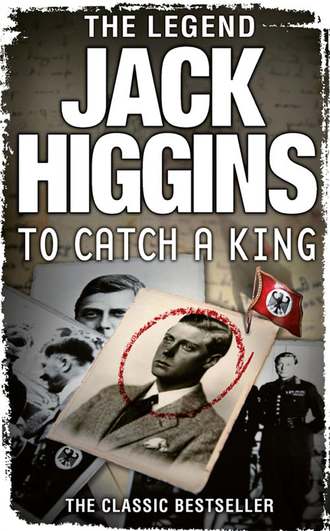
Полная версия
To Catch a King
She was applying her make-up when there was a knock at the door and her uncle entered. He pulled a chair forward and lit one of the small cigars he favoured, watching her in the mirror.
‘All right – what happened?’
She told him quickly, continuing the work on her face, then went behind the screen to change.
‘Not good,’ he said. ‘Perhaps it would be as well if I explained a few things to you. In Germany today the SS is all-powerful, but within the organization they have their own secret service department – the SD. Heydrich is director general although still under the authority of Himmler.’
‘And Schellenberg?’
‘He’s in charge of the counter-espionage section, but, more important, he’s Heydrich’s favourite. His right-hand man.’ She made no reply as she slid a long black dress over her head, taking care not to spoil her make-up. ‘Do you understand any of this?’
‘Not really,’ she said, emerging from behind the screen and turning so that he could button up the back of the dress. ‘So many titles – so many names. It’s all very confusing. And the uniforms – every second person you meet seems to have one.’
He took her hand. ‘This isn’t Forty-Second Street, Hannah.’
She sat down facing him. ‘All right, Uncle Max. Then let’s go home.’
‘You are,’ he said. ‘All arranged – tickets and everything.’
‘I don’t understand.’
‘Connie and the boys leave Monday morning by train for Paris. The same night they’ve got berths on the sleeper to Madrid and so have you.’
‘And when was all this decided?’
‘Today. The boys have got a week at the Flamenco Club in Madrid. You knew that.’
‘But I haven’t.’
‘No, but you can carry straight on to Lisbon from there. Plenty of boats going to New York. You might even get a seat on the Clipper.’
‘And you?’
‘I’ve got things to do here.’
‘Then I’m not going.’
‘Oh, yes, you are, Liebchen.’ She had never heard quite that tone in his voice before. He patted her hand and got up. ‘We’ve got a lot in tonight. I’d better go and see how the food’s working out.’
As he reached the door she said, ‘Uncle Max, you’re mixed up in something, aren’t you? Something serious?’
He smiled gently. ‘I’ll see you later. Slay the people, Liebchen.’
The door closed softly behind him and she sat there, staring into the mirror, her mind in turmoil. A moment later, there was another knock and Connie Jones glanced in.
‘Are you ready?’
She managed a smile. ‘As much as I ever will be.’
Connie was a large, rugged-looking Negro of forty-five, with close-cropped greying hair. Born and raised in New Orleans, he had been playing the piano like a dream since the age of seven and couldn’t read a note of music.
‘Trouble?’ he asked, sitting on the edge of her dressing table.
‘Uncle Max tells me I leave with you on Monday.’
‘That’s it. Twelve hours to gay Paree, then the night, express to Madrid from Austerlitz Station, and I can’t shake the dust of this town soon enough.’ He lit a cigarette. ‘You’re worried about the old man, aren’t you?’
‘He says he isn’t coming, Connie, but if he stays here …’
‘If ever a man knew what he was doing, it’s your Uncle Max, kid. I’d leave it to him.’ He took her hand. ‘You worry too much and that ain’t good because we got a show to do, so let’s get with it.’
She took a deep breath, stood up and followed him out, immediately aware of the club noises. People talking, the laughter, the hustle. It had an electricity to it that never failed in its effect on her.
Two other Negroes waited in the shadows beside the small stage, both younger than Connie. Billy Joe Hale, the bass player, and Harry Graf, the drummer. They dumped their cigarettes and moved on stage with Connie.
Hannah waited and then the spots bathed the stage in white light and Uncle Max’s voice boomed from somewhere at the rear of the room. ‘And now, the Garden Room proudly presents direct from New York, the one and only Hannah Winter.’
And as Connie and the boys moved into a solid driving arrangement of ‘St Louis Blues’, she walked on stage to thunderous applause and started to sing her heart out.
Reinhard Heydrich, unlike most Nazi party members, had been born a gentleman. Cashiered from the navy he had joined the SS and had been quickly chosen by Himmler as his deputy. His rise to the position of head of the Reich Main Security Office, one of the most powerful positions in the state, was a tribute as much to his total lack of any kind of humanity as to his qualities of leadership and superior intelligence.
When Schellenberg entered he was seated at his desk in his Prinz Albrechtstrasse office and was wearing the full dress uniform of an SS Obergruppenführer for he had just returned from dining with Hitler at the Reich Chancellery.
‘Ah, there you are, Walter,’ he said amiably. ‘You’ve been having a busy evening, I hear, playing Galahad to the Winter girl.’
‘Is there anything you don’t know?’ Schellenberg said. ‘It’s only just happened, for God’s sake.’
‘One survives, Walter, in this wicked old world of ours by knowing everything there is to know about everything and everybody.’
‘Which in this case would seem to mean that the people who work for me report to you first.’
‘Of course,’ Heydrich smiled. ‘Tell me about her. How long has she been under surveillance?’
‘Since she arrived. Two months now.’
‘And she really fell for this little drama of yours tonight?’
‘I think so.’
‘What exactly do you hope to achieve? Access to her bed or information?’
‘It’s her uncle we’re after, remember,’ Schellenberg said. ‘The fact that he’s an American citizen makes things difficult.’
‘But he was born a German,’ Heydrich said impatiently. ‘I’ve seen his file and the Führer has stated often enough that citizens of the Reich do not have the right to change nationality.’
‘The Americans might have a different viewpoint on that one,’ Schellenberg pointed out. ‘And this is hardly the moment to antagonize Washington.’
‘So – are we any further forward with this Winter affair?’
‘Not really. As you can see from his file, he attended the University of Berlin as a youth and was a member of the Communist Party. It is my belief that he is a Soviet agent. He’s certainly involved with the Socialist Underground and probably also the illegal transfer of Jews from the Reich.’
‘Then what are you waiting for? Arrest him.’
‘Not just yet,’ Schellenberg said. ‘If we wait a little longer we get not only Winter, but his entire organization. And he is under surveillance at all hours.’
Heydrich sat there frowning, then nodded. ‘Very well, Walter. You can have another week. Seven days and then …’ He stood up. ‘What are you going to do now?’
Schellenberg knew what was coming. ‘Go home to bed.’
‘Nonsense.’ Heydrich grinned. ‘The night’s still young. We’ll make the rounds at a few nightclubs. Help yourself to a drink while I change.’
He went out and Schellenberg sighed, moved to the drinks cabinet and poured himself a Scotch.
He had been born in Saarbrücken – in 1910, the son of a piano maker. Cultured and intelligent by nature and with a gift for languages, he had entered the University of Bonn at the age of nineteen in the faculty of medicine, but changed to the study of law after two years.
Well qualified, but penniless, he saw opportunity in the rise to power of the Nazi Party in 1933 and accepted the suggestion of one of his professors that he join the SS. His gift for languages brought him to the attention of Heydrich who had recruited him at once into the SD where his rise had been meteoric.
A number of successful intelligence operations had combined to consolidate his position, culminating in the Venlo incident in 1939 during which he had posed as a resistance agent to gain the confidence of three British MI5 agents in Holland. This had led to their kidnap by SS troops on neutral territory.
Decorated by the Führer himself he had been promoted SS Brigadeführer and major-general of police and was still only thirty years of age.
Of course, he had his enemies, but Heydrich and his wife liked him so that he moved socially in the very best circles in Berlin. But there was a price to pay, including the occasional night out with Heydrich whose sexual appetite was insatiable and who was never happier than roaming the cabarets and clubs of the Kurfürstendamm and Alexander-platz.
Greatest irony of all, of course, was that Walter Schellenberg was no Nazi. Heydrich, Himmler, even the Führer, all came to trust his judgement implicitly on intelligence matters and yet, always in his mind, he stood on one side, a spectator of the whole sorry charade, as contemptuous as much of himself as of them.
The rain beat against the window and he raised his glass to his reflection, in mock salute.
3
On Thursday morning just before noon, Schellenberg was working at his desk in his Prinz Albrechtstrasse office when the phone rang. He recognized the voice at once – von Ribbentrop.
‘Schellenberg, are you free? I’d like you to come over to see me at once.’
‘Anything special?’ Schellenberg asked the foreign minister.
‘A matter of the utmost importance to the Reich. I can’t discuss it on the phone.’
Schellenberg called Heydrich at once and reported the situation, always aware of his rage at even the slightest suggestion of his personal authority being usurped. For once, Heydrich was more intrigued than anything else and told him to get on with it – with the promise of a detailed report later.
Von Ribbentrop received Schellenberg in his private office at the Reich Chancellery.
‘Good of you to come, my dear fellow. Sit down and I’ll get straight to the point. I am speaking to you on behalf of the Führer himself on this matter, by the way, so we are talking of something with the highest security rating.’
Schellenberg was immediately intrigued. ‘I see. Please continue.’
‘Did you by any chance meet the Duke of Windsor during his German tour in nineteen thirty-seven?’
‘No, I didn’t have that pleasure.’
‘What is your personal opinion about the way in which the English dealt with the crisis surrounding his abdication?’
‘It seems to me they handled the whole problem very sensibly. Tradition and responsibility had to take precedence over personal emotions.’ Schellenberg shrugged. ‘I don’t really see how the British government could have acted any differently.’
Von Ribbentrop looked extremely put out. ‘I can see this is one matter about which you have been completely misinformed. The real reasons behind the pressure for the Duke to abdicate were political. He was too socially aware; too determined to change the decadent English society into something forceful and forward-looking. Something more suited to modern needs.’
‘I see,’ Schellenberg said dryly. ‘He told you this?’
Von Ribbentrop didn’t seem to hear him. ‘He was much impressed with everything he saw in Germany. The Führer received him at Berchtesgaden. They talked together for an hour.’
He paused at the window. ‘At the moment the Führer is totally immersed in the planning of Operation Sea Lion – the invasion of England – which is why he asked me to handle this most important matter for him.’
‘I see.’
‘The Duke, as you know, was serving as a major-general with Allied forces in France. During the débâcle that followed our magnificent victory, he and the Duchess, with a few friends, managed to cross into Spain. They were in Madrid until recently. In fact the attitude of the Spaniards in the matter may be best summed up by this telegram I received from our Madrid ambassador, von Stohrer. I have a copy here.’
He passed it across and Schellenberg scanned it quickly.
The Spanish foreign minister requests advice with regard to the treatment of the Duke and Duchess of Windsor who were to arrive in Madrid today, apparently in order to return to England by way of Lisbon. They assume we may be interested in detaining the Duke here and possibly in establishing contact with him.
Schellenberg handed the paper back. ‘I don’t understand.’
‘It’s really very simple. The English are racially a part of our Germanic brotherhood. The Führer has no wish to destroy them. They could have an important part to play in the greater European ideal. He is convinced that, any day now, the British government will see this and will sue for peace. After all, they don’t have much choice. They’re finished.’
‘There’s still the Channel to cross,’ Schellenberg pointed out.
‘But there won’t be any need, don’t you see? And once a peace treaty has been concluded, there would be the question of the throne to consider. Much better for all concerned to see it occupied by a man loved by his people, who was also a good friend to Germany.’
It was with difficulty that Schellenberg stopped himself from laughing out loud. ‘Are you really serious, Minister?’
Von Ribbentrop seemed mildly surprised. ‘But of course. I have here a copy of a report sent to the American secretary of state on the second of July by their ambassador in Madrid in which he states that in a conversation with a member of the embassy staff, the Duke declared that the most important thing now was to end the war before thousands more were killed or maimed to save the faces of a few politicians.’
‘Which hardly makes him a National Socialist,’ Schellenberg said.
Von Ribbentrop rolled on relentlessly. ‘The Duke and Duchess arrived in Lisbon recently and are staying at Estoril in the villa of a Portuguese banker, Dr Ricardo de Espirito Santo é Silva. On their arrival they found two British flying boats waiting to take them to England. The Duke sent them back. Refused to go. Don’t you find that interesting?’
‘Did he give a reason?’
‘According to our information, he insisted on the offer of a worthwhile post and assurances that the Duchess would be treated in future in full accord with her status as his wife.’
‘That seems reasonable,’ Schellenberg said. ‘They’ve hardly made the best use of his talents so far in this war. Has he had a reply?’
‘Apparently Churchill is offering him the governorship of the Bahamas.’
‘Clever,’ Schellenberg said. ‘And practical. Three thousand miles from the war. Has he accepted?’
‘Not yet. Quite obviously, he’s stalling for time. We feel he would probably far rather stay on in Spain or possibly even in Switzerland. Naturally that gangster Churchill and his clique wouldn’t like this and we may assume that the British Secret Service would take a hand.’
‘In what way?’
‘Oh, I should imagine the obvious ploy would be to make sure the Duke got on the boat to the Bahamas whether he wanted to or not, which is where you come in, Schellenberg. The Führer feels you would be the ideal man to speak to the Duke on our behalf. Offer any assistance he may need. Financial, for example, if that is necessary. Whatever happens, the Duke must be given help to reach the country of his choice.’
‘Even if that proves to be the Bahamas?’
Von Ribbentrop glanced at him. ‘My dear Schellenberg, as I’ve told you before on many occasions, that facetiousness of yours could well be the death of you one of these days.’
‘My apologies, Minister.’
‘To continue. If the Duke should prove in any way hesitant the Führer would have no objection to your helping him reach the right decision.’
‘By force?’
‘If necessary. Naturally, it will also be your responsibility to see that the Duke and his wife are not exposed to any personal danger. A hunting trip into Spain is all it takes. Once you have them over the border, the rest is simple.’
Schellenberg said, ‘And this is a direct order from the Führer himself?’
‘But of course.’ Von Ribbentrop passed an envelope across. ‘You’ll find everything you need in there. Total authority. I can only wish you well and envy your inevitable success in this matter.’
Heydrich sat by the window in his office holding the document in his hand.
FROM THE LEADER AND CHANCELLOR
OF THE STATE
MOST SECRET
General Schellenberg is acting under my direct and personal orders in a matter of the utmost importance to the Reich. He is answerable only to me. All personnel, military and civil, without distinction of rank, will assist him in any way he sees fit.
Adolf Hitler
‘Nonsense!’ Heydrich said. ‘Sheer bloody nonsense and all built on totally false assumptions.’
There was a knock on the door and a young secretary entered with a file which she placed on his desk. She went out without a word and Heydrich tapped it with a finger.
‘In here, Walter, is everything you need to know about the Duke of Windsor – everything recorded about him, but what have I taught you to be the first and most fundamental principle of intelligence work?’
‘As the Jesuits put it; by the small things shalt thou know them.’
‘Exactly. It is not what a man says or what people say about him that is the truth. It is how he behaves, for character is action.’ He tapped the file. ‘And nowhere more so than with this man. How would you describe him – in the world’s eyes?’
‘A contradiction. Concerned about his fellow men – his attitude to the English working classes proved that – and yet fond of luxury and pleasure. A difficult man; reserved.’
‘Perhaps. Certainly stubborn.’
‘Because of his stand on the question of marrying the Duchess? Some people might find that admirable. In the past, the hypocrisy of many kings of England in sexual matters is a fact of history. Perhaps the Duke was actually taking a moral stance on this occasion as a matter of principle. To do otherwise, to humiliate the woman he loved might have seemed to him the most contemptible thing he could imagine.’
‘When he was serving with the British Military Mission in France in what was meant to be a dead-end job, he managed to make several tours of the Maginot Line.’ Heydrich opened the file. ‘There is a copy here of a letter sent to the War Office by Major General Vyse. He gives details of a report by the Duke after an inspection of the French First Army and summarizes it as follows:
1 There is little attempt at concealment.
2 The revetment of the anti-tank ditches is weak. Other anti-tank obstacles do not seem to be adequate.
3 Wiring against infantry coincides on location with anti-tank obstacles so that the same bombardment would destroy both.
4 Anti-tank crews seem insufficiently trained.
5 Work does not seem to be carried out intensively and very few troops were seen.
‘You see?’ Heydrich said. ‘Every evidence of a first-class military mind. Anyway, take it away. Go through the whole file. Get to know the man and then at least you’ll know what you’re talking about.’
‘You wish me to take on this task?’
‘I’m not certain. I’ll let you know this evening. In the meantime, do me the usual departmental report. Everything von Ribbentrop said. I want it all down on paper.’
When Schellenberg reached his own office he called in Frau Huber, Heydrich’s confidential secretary. She was thirty-eight, a sensual, rather fleshy-looking woman with no make-up, her hair pulled back from her face in a tight bun. She was a war widow already; her husband, a Sturmscharführer in the Leibstandarte SS Division, had been killed during the French campaign. In her simple white blouse and skirt, she was surprisingly attractive.
Schellenberg quickly dictated an account of his meeting with von Ribbentrop. ‘As soon as possible, please.’
She went out and he opened the Windsor file and started to work his way through it. It didn’t take long, just under half an hour. As he finished, Frau Huber returned with the completed report. He checked it over and signed it.
‘The usual copies?’ she asked.
‘Yes, one for the Reichsführer, one for me and one for the file.’
She went out. He sat there frowning for a moment, then picked up the phone and asked for Admiral Canaris at Abwehr Headquarters on the Tirpitz Ufer.
The admiral, it seemed, was not available. Schellenberg smiled. That probably meant that as it was Thursday afternoon, Canaris would be riding in the Tiergarten. He picked up the telephone, ordered a car and left quickly.
When Frau Huber went into the copying room, there was only a middle-aged woman on duty who was unfamiliar to her.
‘Who are you?’ she demanded.
‘Irene Neumann, I usually work in Central Office.’
‘I see. Run this through the machine now. Three copies. One for the boss, one for General Schellenberg and one for me. I’ll wait.’
The other woman set the machine up quickly. For your eyes only – most secret. She took in that much and then the phrase Duke of Windsor seemed to jump right out at her.
Frau Huber lit a cigarette and paced about the room restlessly. ‘Hurry up, for God’s sake.’
As the machine started, the phone rang in her office and she hurried to answer it. It was a routine matter taking only three or four minutes to handle. As she finished writing a memo, there was a nervous cough and she turned and found Irene Neumann standing there.
‘Three copies, you said, Frau Huber?’
‘All right. Put them on the desk.’
The other woman did as she was told and went out. Back in the copying room she closed the door carefully, then opened a drawer and took out the extra copy of the Windsor report that she had made. She folded it carefully, raised her skirt and slipped it inside the top of her stocking.
A moment later, the door opened and a young woman in SS auxiliary uniform entered. ‘Have you been busy?’
‘Not particularly.’
‘Good. You can go now.’
She started to unbutton her uniform jacket and Irene Neumann took down her coat from behind the door and left.
Admiral Wilhelm Canaris was fifty-two. A U-boat commander of distinction during the First World War, he was now head of the Abwehr, the Intelligence Department of the German Armed Forces High Command. Although a loyal German he, like many of the officer class, loathed most aspects of the Nazi regime, an attitude that was to lead to his downfall and execution towards the end of the war.
Schellenberg was on close personal terms with him and they frequently rode together in the Tiergarten. As he waited beside his car, he could see the admiral now, cantering along the ride between the trees followed by his two favourite Dachshunds who were obviously experiencing some difficulty in keeping up with him. He saw Schellenberg when still some little distance away, waved and turned towards him.
He reined in and dismounted. ‘Business, Walter, or conversation?’
‘Interchangeable, I usually find.’ Schellenberg called to his driver, ‘Come and hold the Herr Admiral’s horse.’
They walked amongst the trees, the Dachshunds waddling at their heels.
‘How goes the war then, Walter? From your point of view, of course.’
‘Well, Herr Admiral, I think we could agree on that.’
‘And Sea Lion?’
‘Only the Führer has the facts there.’
‘And expects the British to sue for peace any day. Do you think they will?’
‘Not really.’
‘Neither do I. Not with the Channel to cross. And they always do so damned well with their backs to the wall. You heard the gist of Churchill’s speech? Fight on the beaches, in the streets. Blood, sweat, tears.’
‘There’s still the Luftwaffe to come.’
‘I know,’ Canaris said scornfully. ‘Fat Hermann boasting again. Reduce London to ashes, bomb them into submission. Wasn’t that what he was supposed to do to the British army at Dunkirk? Instead, the Luftwaffe got all hell knocked out of it by a handful of Spitfires.’
His face was stiff with anger and Schellenberg watched him closely. He genuinely liked Canaris; admired him as a man. On the other hand, the admiral was undoubtedly indiscreet. He was already suspected by Heydrich and Himmler, as Schellenberg well knew, of having leaked the date of the attack in the west to the Allies, which, if it was true, had certainly done them little good.









